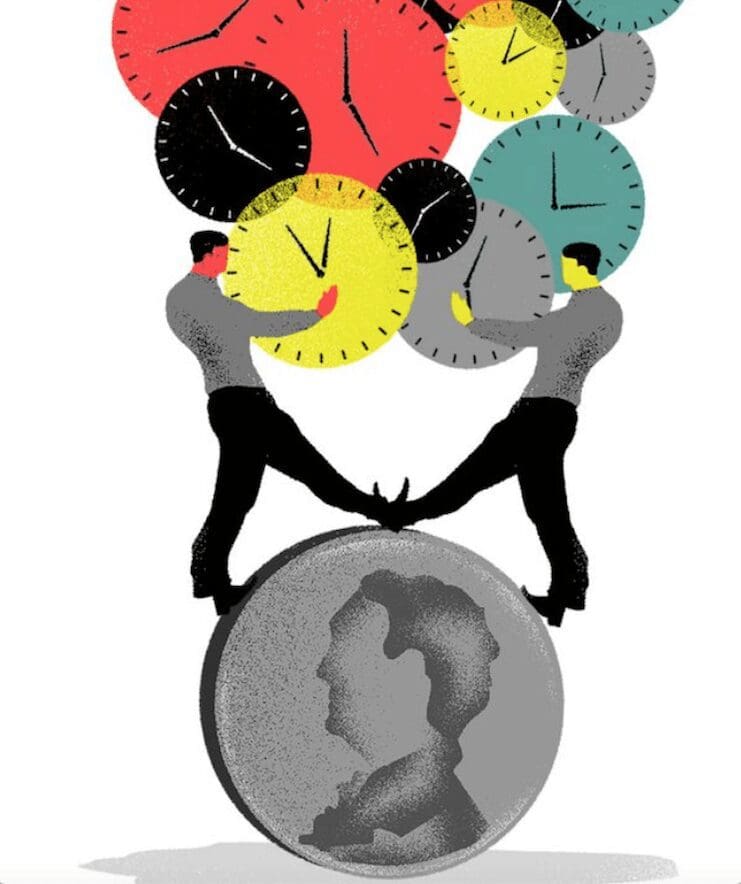As artificial intelligence and automation multiply, so do dystopian predictions that millions of employees will become redundant, their tasks performed more reliably and cheaply by a machine.
But must the “robot apocalypse” be quite so apocalyptic? It may provide a once-in-a-generation opportunity to rewrite the basic contract of the labor market: Your paycheck reflects your contribution. In this alternative future, robots will take over much of the routine drudgery, freeing millions of us to do what we truly love or society truly needs, from raising children to writing poetry to befriending the lonely.
The key to making this happen is “universal basic income,” or UBI, a lump sum every adult gets regardless of job status, income or ability. UBI proposals date back centuries but interest has surged in recent years. Advocates on the left see it as the solution to intensifying income inequality as automation displaces middle-skill jobs such as assembly-line workers and secretaries. Advocates on the right think it’s a tidier, less paternalistic alternative to the countless means-tested programs that comprise the current safety net.
The most prominent advocate is Democratic presidential candidate and entrepreneur Andrew Yang, who routinely warns audiences that automation is about to wipe out millions of good paying jobs. The centerpiece of his campaign is the “Freedom Dividend,” $1,000 paid each month to every adult, no strings attached.
Value and price aren’t the same thing. Some of the most valuable work in society is unpaid. And because it’s unpaid it’s undersupplied since the people who would supply it, usually women, are out earning a living.
Critics say UBI is anti-work since it makes it easier for recipients to quit their jobs. In an interview Mr. Yang counters that it’s pro-work once you “broaden what we think of as a job. My wife is at home with our two boys, one of whom is autistic. She works incredibly hard and is doing vital and challenging work for the next generation that I think is probably a million times more of a contribution than many of the jobs that are out there where someone is showing up nine to five.”
INCOME FOR ALL
Andrew Yang, entrepreneur and a Democratic presidential candidate, has made universal basic income a central issue of his campaign. Hear his perspective on guaranteed income for every American, and what legislative challenges that policy might face.
The border between paid and unpaid work has always been somewhat arbitrary. In 1965 the economists James Tobin and William Nordhaus, both of whom would later win the Nobel Prize, estimated that if unpaid activity including child care, cleaning and food preparation were paid, gross national product (similar to GDP) would be roughly 50% larger.
Around that time, much of that work did start to get paid. Women began joining the job market in droves, paying others to do some of what they used to do for free. Between 1960 and 2000, the share of women who were homemakers fell to 30% from 56%, while the share of women who were paid workers increased to 70% from 40%, economists Nancy Folbre and Julie Nelson wrote in the Journal of Economic Perspectives in 2000. “Paid child care, nursing homes for the elderly, talk therapy and phone sex are just a few examples” of tasks that have moved from the “private realm of family and social relationship” to the “public world of markets and government,” they wrote.
On the plus side, this gave women newfound economic and personal freedom. And sometimes paid workers did the job better: Nursery schoolteachers had training that most parents lack. On the minus side, many of the newly created jobs also went to women who ended up poorly paid; child care is notorious for high turnover and spotty quality, Ms. Folbre and Ms. Nelson noted. More than a few parents would prefer to stay home with their children, but can’t afford to.
Some argue this means too much of what was once outside the market has become part of the market, and should move back. “The market systematically ignores many of the things that we know are incredibly important,” Mr. Yang says. “Not just parenting and nurturing and caregiving. There’s also volunteerism, and arts and creativity and entrepreneurship and risk taking.”
THE FUTURE OF EVERYTHING | WORK
What’s next for work life.
One way UBI could revive volunteerism is through “time-banks.” First proposed in the 1980s by Edgar Cahn, a speech writer for Sen. Robert Kennedy, time banks are co-ops in which one member performs a task for another, such as taking an elderly neighbor to the doctor, and receives a one-hour credit the member can later use, for example, for piano lessons from another member. They aren’t physical structures but ledgers, originally on paper but now typically online.
They’ve struggled to evolve beyond a niche. Much of what people need can’t be purchased with their own time: car repairs, doctor’s care, shelter. One of the more successful time banks is in Wisconsin’s Dane County (which includes Madison, the state capital). It has 2,800 registered members of whom 100 are logging activity at any given time. Stephanie Rearick, who founded it in 2005, says UBI could free more people to do the types of work that they and society really need via the time bank. Mr. Yang believes volunteering such as through time banks could be “supercharged” by UBI.
UBI is not the only new idea for remaking the labor market. Rather than pay people for work on which the market doesn’t put a price, why not put a price on work that is now unpaid? That idea is gaining currency with the rise of online platforms. When you search on Google, “like” a post on Facebook or send a tweet on Twitter, you contribute data that makes the algorithms that drive these platforms smarter, and more profitable for the companies who use the data to sell ads or other products. Glen Weyl, an economist at Microsoft Corp.’s in-house think tank, and Jaron Lanier, a computer scientist credited with creating virtual reality, say users should be paid for their contribution. They propose the creation of “mediators of individual data,” essentially guilds that would negotiate with digital companies on behalf of their users to set the price and conditions under which their data can be used. “A future person of retirement age will earn a small sum from each of hundreds of data schemes they participated in over their lifetimes (captioning pictures, commenting on products, and the like),” they wrote in Harvard Business Review in 2018.
The political and logistical barriers to both ideas are formidable. Digital companies point out no that one is being forced to contribute their data, suggesting users feel they are getting something valuable in return.
INTERACTIVE
The Office of Tomorrow
Technology is transforming the nature of work. In the coming decades, the office as we know it will likely disappear. Here’s what might take its place.
Technology is transforming the nature of work. In the coming decades, the office as we know it will likely disappear. Here’s what might take its place.
As for UBI, the robot apocalypse is so far nowhere to be seen: Unemployment is at a 50-year low and productivity growth, where automation’s impact should show up, is sluggish. Then there’s the cost. Mr. Yang says UBI would be financed through a 10% value-added tax and the extra economic growth and tax revenue that increased spending would generate. Kyle Pomerleau, an analyst at the Tax Foundation, a think tank that favors lower taxes, is doubtful. He estimates the Freedom Dividend would cost $2.8 trillion a year while Mr. Yang’s taxes and savings on other safety net programs would only raise $1.4 trillion, and the taxes would end up shrinking, not expanding, GDP by discouraging paid work.
Mr. Yang says making UBI universal will make it politically more popular. But universality makes it dramatically more expensive, requiring a tax “that vastly exceeds anything in U.S. history,” Robert Greenstein of the left-of-center Center on Budget and Policy Priorities said in a commentary. He worries UBI would divert resources from safety-net programs, leaving the poor worse off. (Mr. Yang would let people choose between UBI or existing safety-net programs.)
No one ever said remaking the link between labor and money would be easy. Still, even if these ideas never get off the ground, the relentless advance of technology guarantees there will be more ideas to come.





















